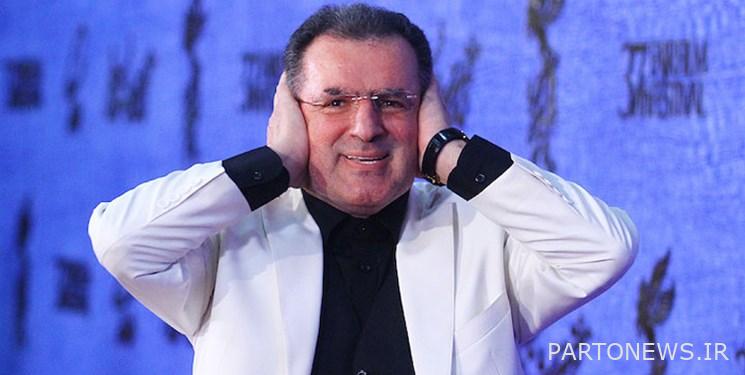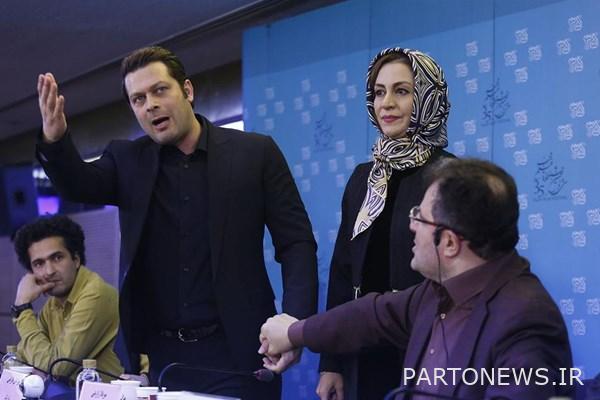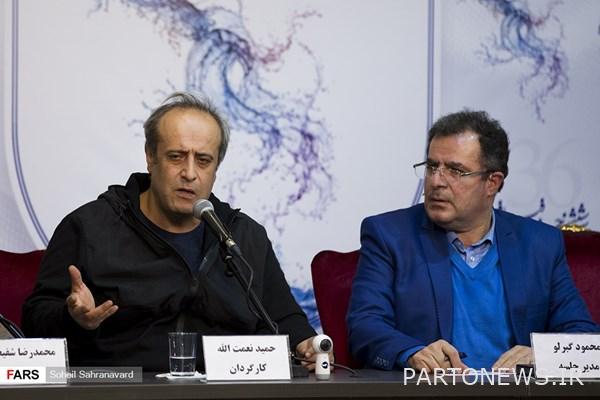Fajr Film Festival | Gaberlou: Provide a free space for journalists / Iranian cinema wants a “film commentator”

Fars News Agency, Cinema Group: When we talk about the Fajr Film Festival and the main film screening center of this festival, in addition to the topic of watching the film and the presence of the media, its fringe news conferences also come to mind. Meetings that form an important part of the “festival event” and if we want to talk about its history, we must mention the first Fajr Film Festival.
Fajr Film Festival press conferences are among the sections that have always changed during different periods of the festival. One year they restricted the attendees, the next year they wrote down the questioning by the reporters, and one year they cleared the whole issue of how the meetings were held and held them again in the traditional way.
Such changes in the structure of the Fajr Film Festival have always provoked protests from filmmakers and the media, as these changes make it more difficult to manage attendance at the Fajr Film Festival and prevent the media from covering the festival as much as they should.
Now, all those different events have been recorded in the history book of the Fajr Film Festival, and a new office is to be opened for the 40th edition of this festival. A festival whose organizers have changed this year and, according to them, have adopted a new policy for holding this cinematic event.
Mahmoud Gaberlou is one of the people who knows the category of press conferences of Fajr Film Festival well. A person who is not only a critic of Iranian cinema, but has been in charge of holding these meetings for several years since the 15th Fajr Film Festival. The years when each of them figured out new events and had different margins. We talked to him about news conferences and the strengths and weaknesses of these conferences. We read this conversation below.
We do not have the correct definition of a press conference
* Mr. Gaberlou, you are one of the people who know the press conferences of Fajr Film Festival well, how do you evaluate the situation of these conferences during different periods of the festival?
Yes, from the 15th Fajr Film Festival onwards, I have had the experience of holding Fajr Film Festival press conferences in different periods. I have also traveled to various countries and reviewed the press conferences of major film festivals around the world. From my experience, I can say that the press conferences of any of the world’s major festivals are not held in the same way as the Fajr Film Festival.
Q: What do you think is the problem with Fajr Film Festival press conferences?
In my opinion, the big problem of Fajr Film Festival press conferences in the past is not having a correct definition of how to hold a press conference in a film festival. We must first have a proper definition of a press conference and distinguish it from specialized film review sessions. A press conference, as defined in various media definitions, is a meeting that takes place after or before an event, and members of the media raise questions, criticisms, and suggestions with the officials or filmmakers of that event or film, recording the answers of those officials or filmmakers. And publish in their media. This is very different from specialized sessions where Iranian film critics watch a film and analyze it in a quiet atmosphere.
Q: But we see the presence of critics in the press conferences of the Fajr Film Festival?
Unfortunately, this is true, some critics of Iranian cinema are present at the press conferences of the Fajr Film Festival and analyze the film that has been shown. In my opinion, it is not appropriate for a critic to appear in press conferences and try to address an important issue such as film criticism in a maximum of five minutes, in which case the dignity of the critic is not respected.
Provide a free space for journalists
* What is the optimal form of holding Fajr Film Festival press conferences in your opinion?
I think we should provide a free space for the reporter to stand in the press conference and ask his question, just like the scene we see in the press conferences of film festivals around the world.
In no festival in the world is it customary for a reporter to write his question on a piece of paper and then go through a hundred channels and finally reach the moderator, and the moderator decides to read that question or put it aside. In a situation where the filmmaker does not know at all whether the journalist who asked the question is present in the hall or not.

Stories of insults and ridicule
* In news conferences, we see filmmakers not answering reporters’ questions, how do you see this happening?
When filmmaking freely makes and shows two hours of film, naturally every journalist can ask questions about the film, its subject matter and story. The filmmaker has to answer all the reporters’ questions when he was behind the podium of the festival press conference. Unfortunately, we see in the meetings of the Fajr Film Festival that the filmmaker or the agents and actors of a film remain silent, insulting and mocking in response to the reporter’s question. This scene is one of the ugly events of the Fajr Film Festival press conferences.
The reporter is a kind of representative of the audience of Iranian cinema, and when he raises a question, this question is also raised by the audience at the time of screening, and a clear answer must be provided for it. Therefore, filmmakers and filmmakers must prepare themselves to answer any questions when attending a press conference.
Each media is a representative
* How journalists attend press conferences has always been a topic of discussion, what do you think should be the management of this section?
Yes, this is one of the important points in the press conferences of Fajr Film Festival. About two thousand people will receive the Fajr Festival card, and all of these two thousand people will be able to attend press conferences. This issue causes excessive congestion in the press conference section of the Fajr Film Festival and makes it difficult to manage the meeting.
If I believe it is a press conference for a group of journalists who came to the Fajr Film Festival a year ago. 10 journalists from one media outlet may be present at the festival screening; But someone must be introduced as a representative of that media and be present at the news conference. The other person should coordinate the question he wants to ask with his secretary and editor so that no problem arises.
During the press conference, he asked a question in one of the press conferences of the Fajr Film Festival. Immediately after the meeting, the secretary and the editor of that media announced that this question was not our media question and the reporter himself asked this question. This kind of attitude is very wrong, because when a journalist with the name and card of a media outlet attends the festival, he represents his media outlet at that festival.

Q: Mr. Gaberlou, there are a lot of critics at the Fajr Film Festival. How do you evaluate this presence, considering that you are a member of the Critics’ Association?
Every year, more than 400 critics receive a card from the Iranian Cinema Critics Association and attend the Fajr Film Festival to watch the festival films, which are mainly important works on Iranian cinema a year ago, and during and after the festival. Write about these works.
For several years now, some critics have been attending the festival’s press conferences, and sometimes a representative of these critics sits next to the filmmaker and critiques the film. I do not understand at all why it is necessary for a critic to be present at a press conference where questions and answers are asked about the film and, worst of all, to speak. In none of the major festivals in the world do critics attend the press conference. There are usually separate sessions with critics who specialize in film criticism.
Iranian cinema wants a “film commentator”
Q: Based on what you have said, do you seem to have any criticisms of the film criticism in our country’s cinema?
Yes, I have been thinking for some time, why do we use the word “criticism” in Iranian cinema at all? In my opinion, today we need a “commentator” more than a “critic” in our country’s cinema.
At one time, world cinema was made in the “classic” format. Film critics also critiqued the film by carefully studying “classical” cinema. Hitchcock’s work, for example, was such that filmmakers and critics could analyze or critique it in a “classical” way; But now that filmmaking has changed and become very “modern”, it is no longer a matter of “classical” structures of the past.
For example, you can not analyze the works of Mohammad Hossein Mahdavian by understanding the classical structure. So if the critic has not seen the new works of world cinema, has not studied the new ways of criticizing the world, you can not actually write a proper critique.
Content has been overlooked in cinema reviews
* How do you evaluate the reviews that are currently being written?
The bad thing we see in our country’s critique is that our critics merely critique the structure and ignore the content. The main reason for this is the lack of knowledge of some Iranian cinema critics about political and social issues. I do not know how to ignore the content of a film, which is somehow the director’s theory about a subject and is very important, and just talk about the form of making a film and call it a complete critique.
For example, the movie “White Cow Ode” made by Behtash Sindeh is about “Judgment”; But I saw few critics to analyze the content of this film, all the critics were concerned with the technical points and form of this film. This is a big mistake, because the filmmaker made two hours of film to put an idea in the mind of the audience with the content of his film, then we, as critics, abandon this important issue and turn to other issues.

That’s why I say we should have a “commentator” on the film. The film commentator analyzes the content of the film and examines this missed point by an expert. In my opinion, Iranian cinema should move towards training “film commentators”, because the old way of a person coming as a critic and targeting the film with whips of words is no longer obsolete in the world and has no place.
Today, we have young people in our country who produce films like “Mansour” and deal with important personalities such as Martyr Mansour Sattari. At that time, we do not have a single critic to come and put the film “Mansour” next to the character of Martyr Sattari and provide a correct and accurate analysis.
Asghar Farhadi is a world cinema businessman
* You also talked about how Asghar Farhadi was filmed, how do you see his filmmaking?
In my opinion, filmmakers like Asghar Farhadi are copying Western cinema. For example, the category of “not lying” is very important in European cinema today, and the subject of many foreign films has gone in this direction. Asghar Farhadi wants to be a global cinematographer, so he learns the global formulas of cinema and uses the same formulas and rules to produce his new films.
* Cinema and theater group suggested news
End of message /
.

